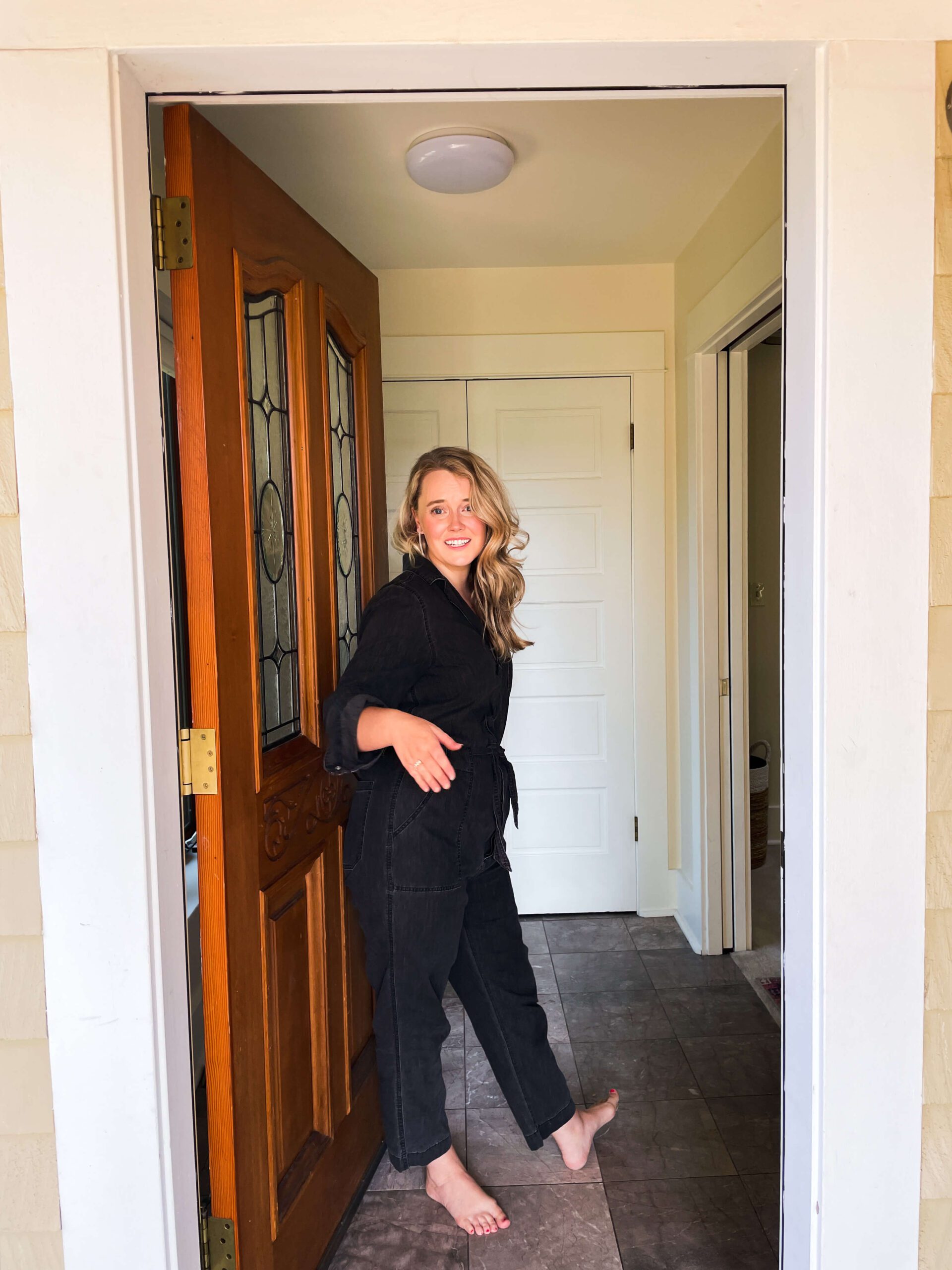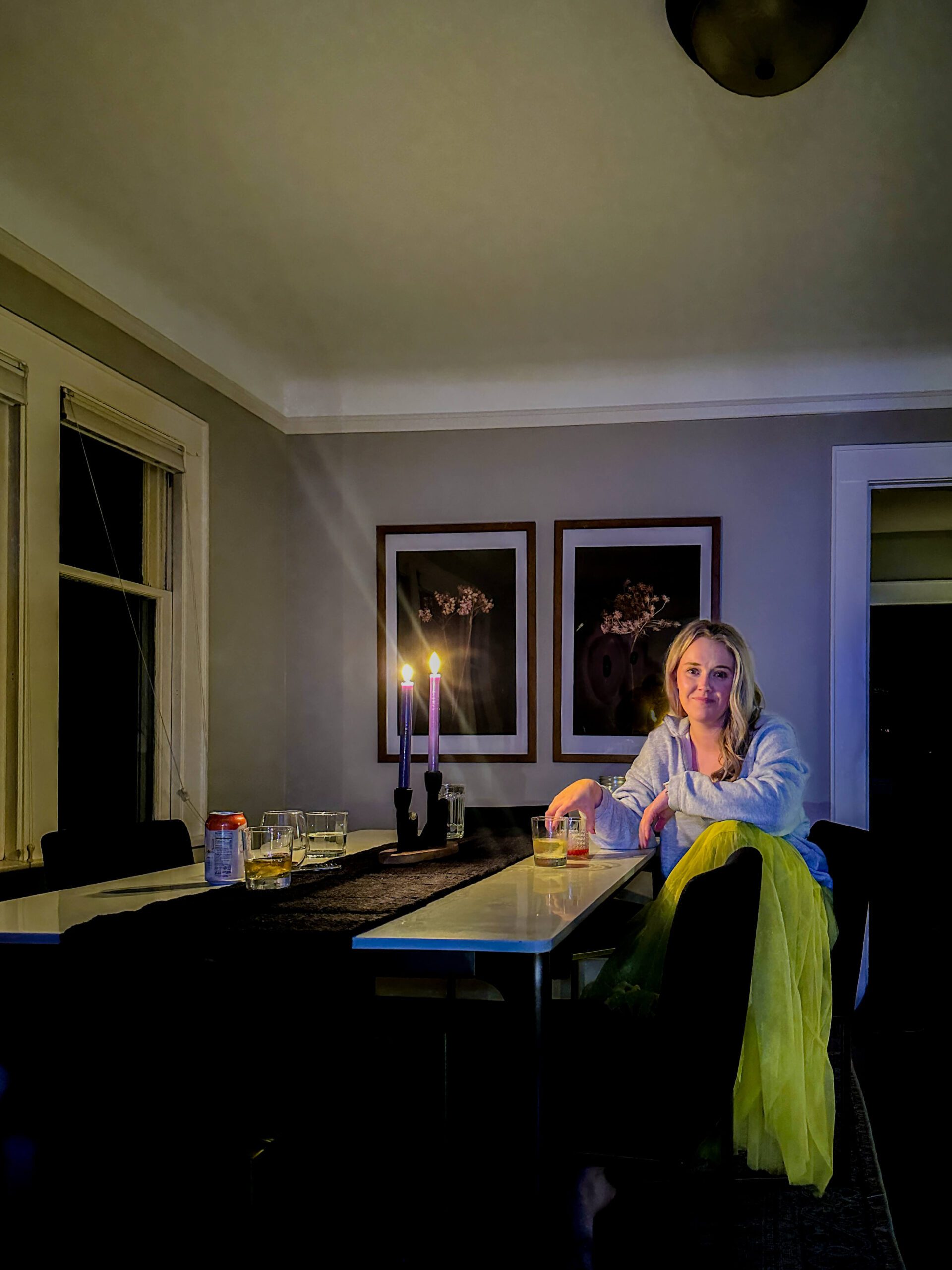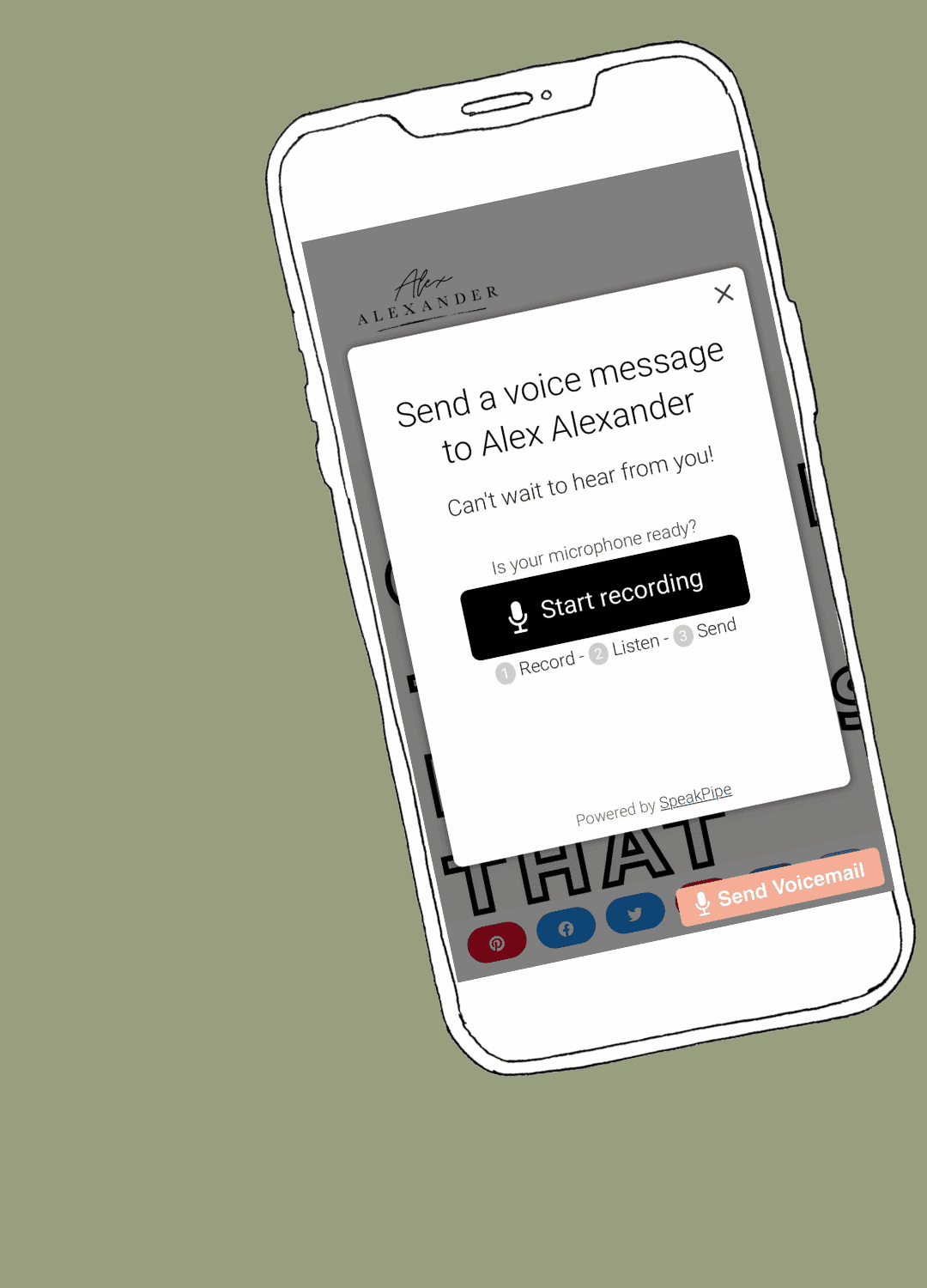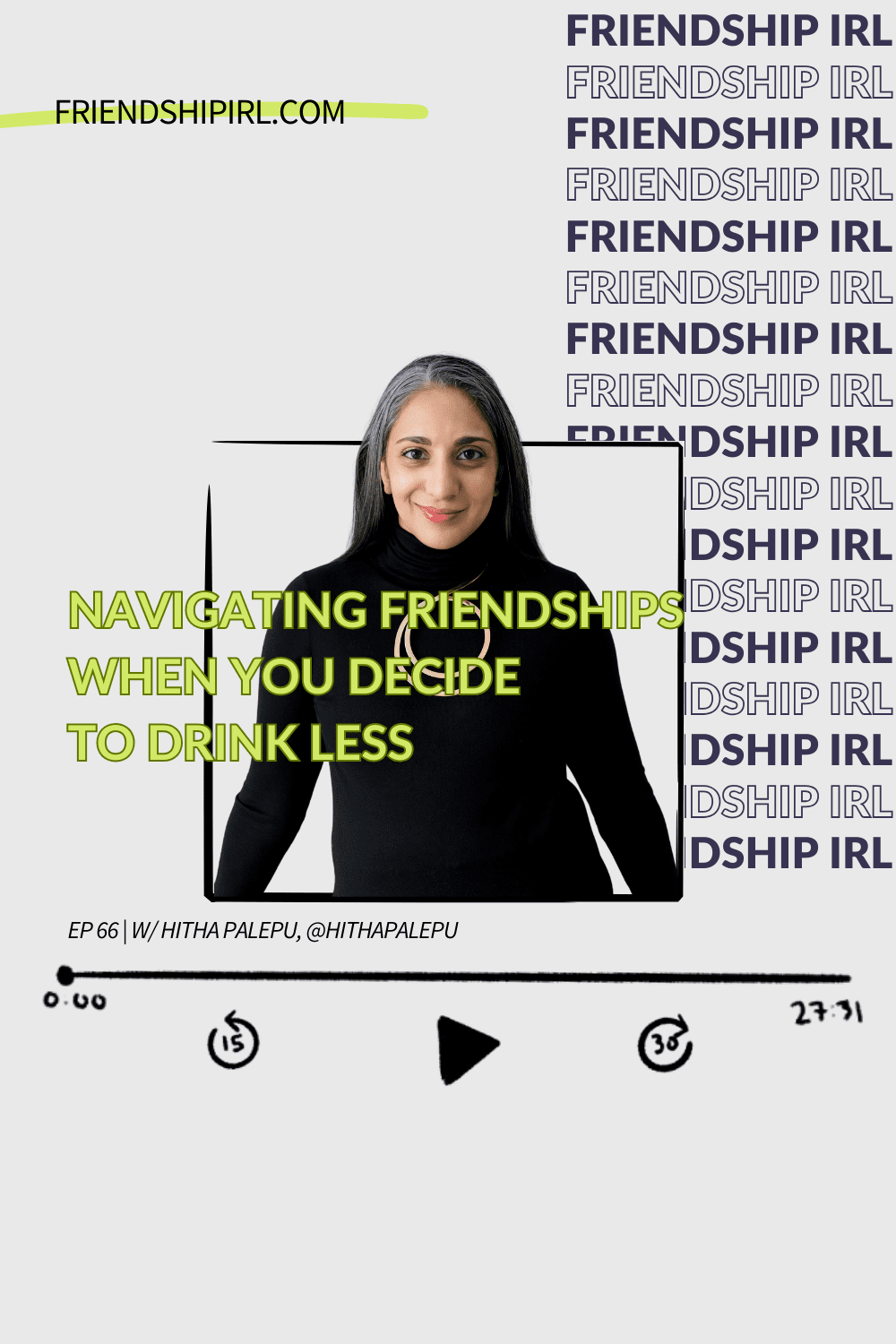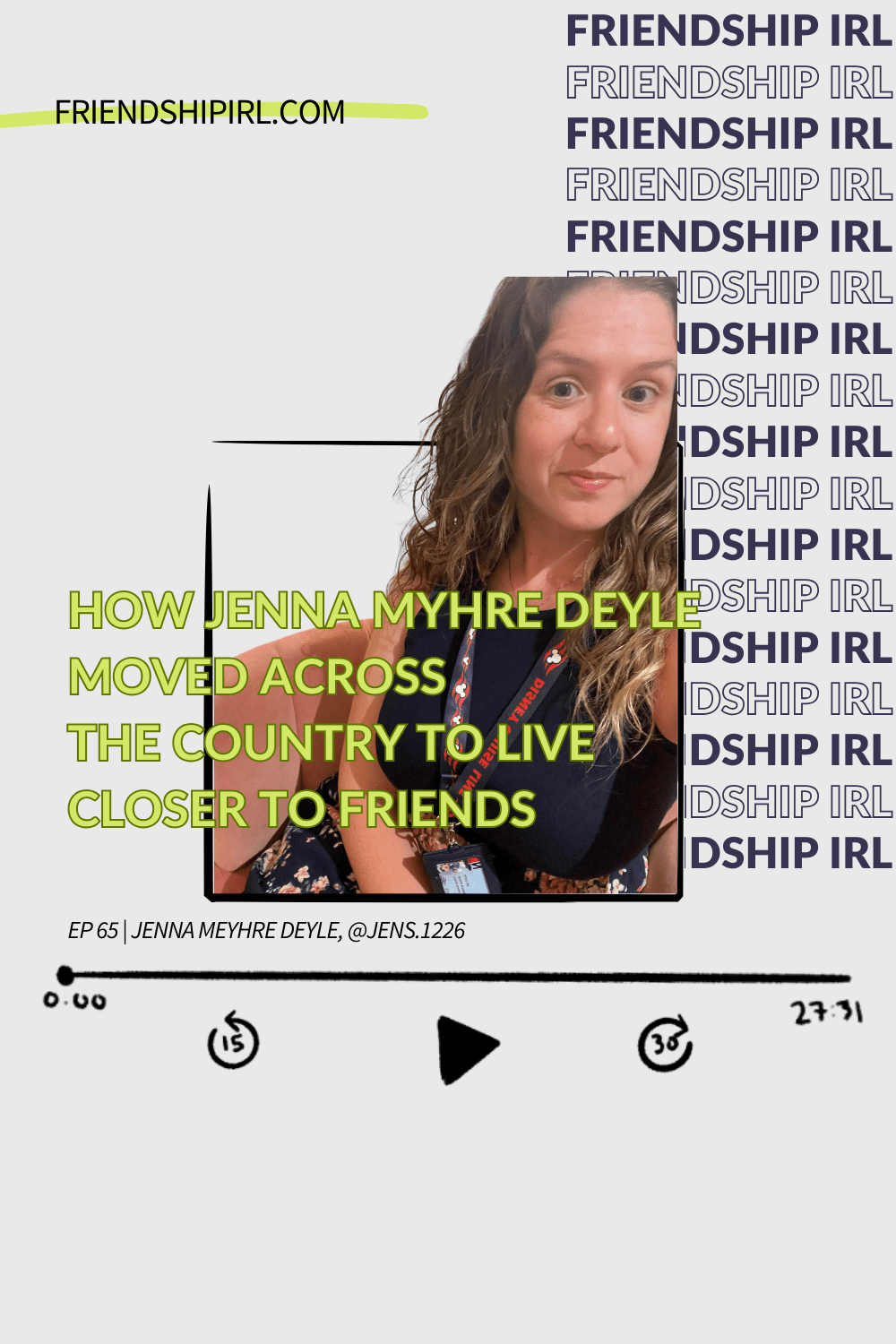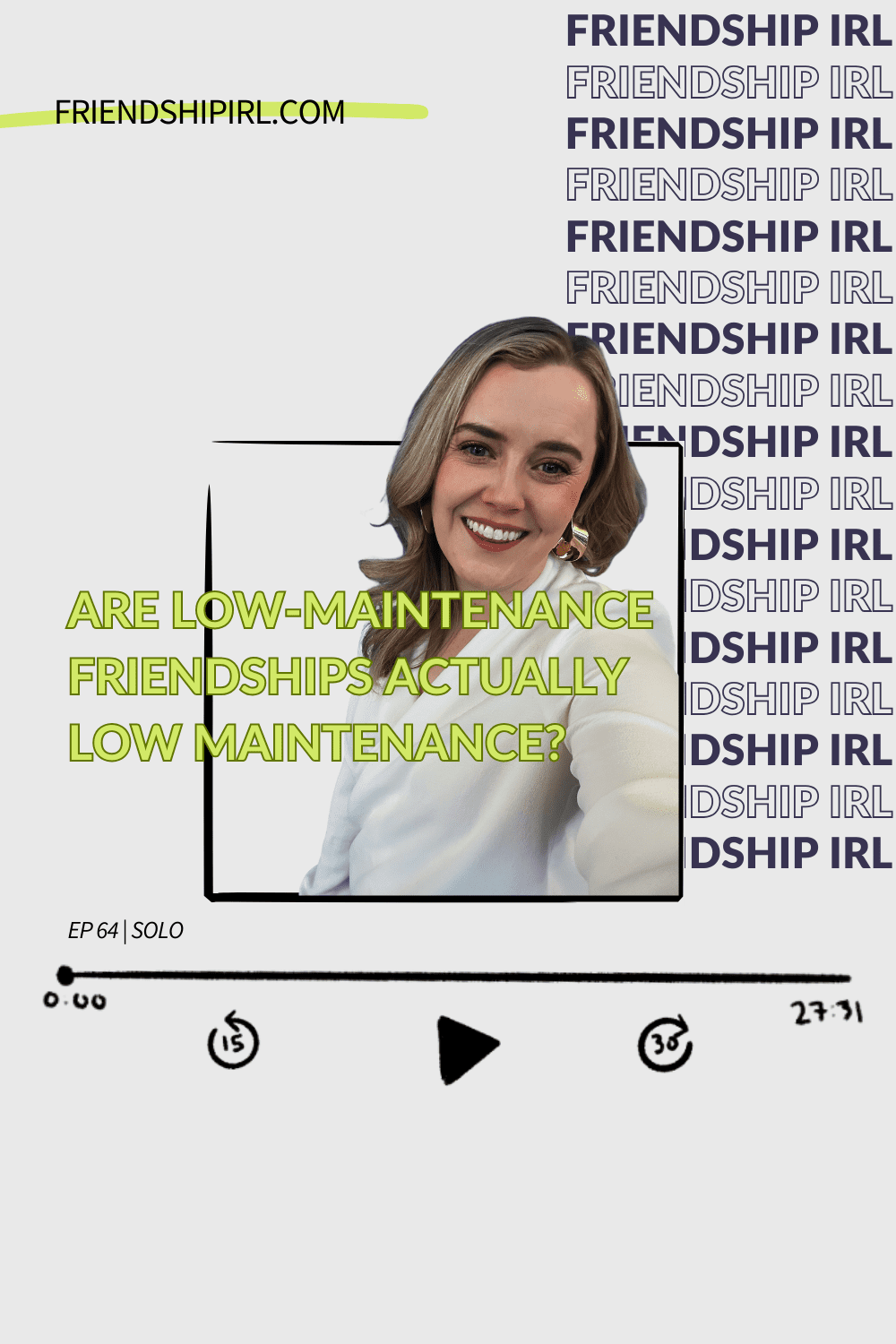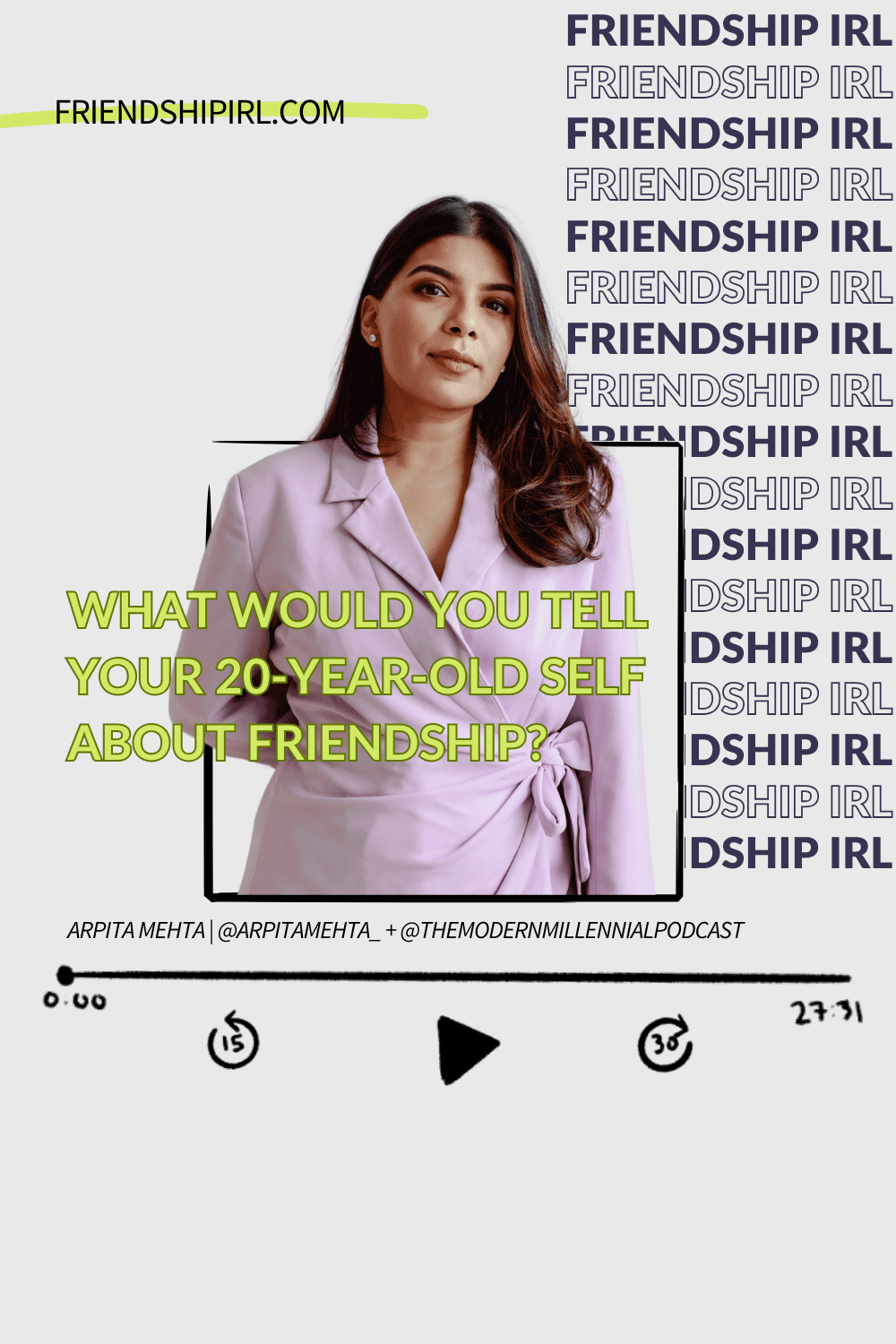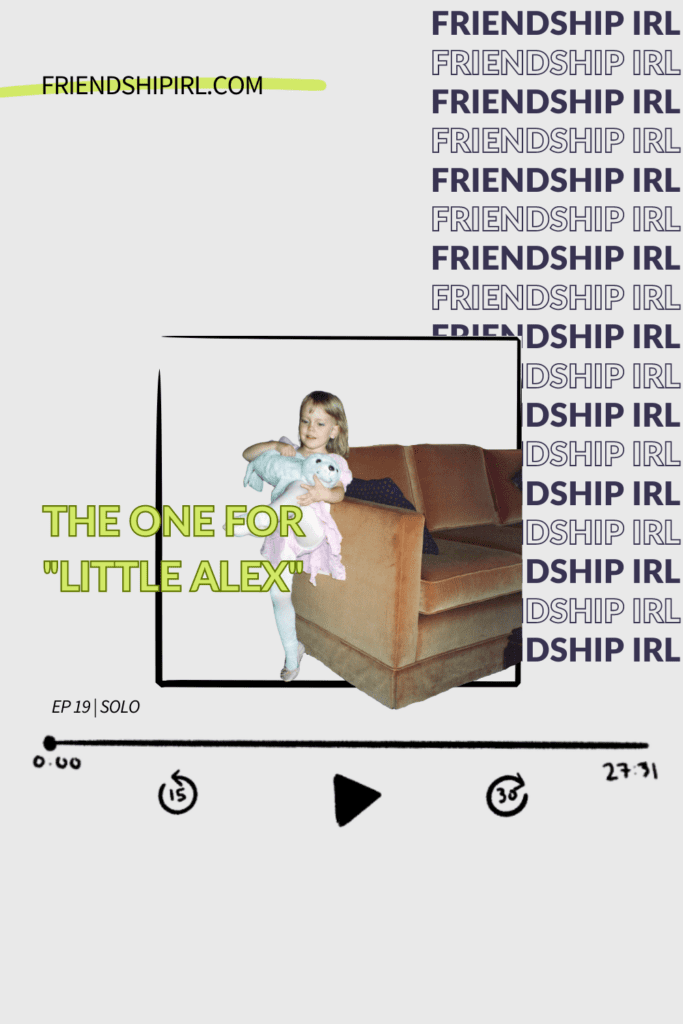
Podcast Description
I can’t believe I recorded this episode.
I hope this work – bringing more community + friendship-focused conversations to the world – causes a ripple of change. In my wildest dreams, we all see a societal shift in how we think, speak, and act regarding community + friendship in our lifetime.
But I’d be lying if I told you this work is all 100% selfless.
At the core of this work is a selfish desire:
I want my support system to be seen as valid.
Presently, that isn’t the reality.
I am almost always met with resistance when telling people about the alternative support system I’ve built.
“But those people aren’t really your family.”
“Your nieces and nephews… aren’t those your friends’ kids? You aren’t their real aunt.”
“You aren’t spending the holidays with your family…?”
“Family is everything” being accepted blindly as an absolute truth in society harms some people – myself included.
Please listen to today’s episode with an open mind. I am sharing a deeply personal perspective that isn’t often discussed.
I hope this episode challenges societal narratives and leaves everyone with a new perspective that causes us to approach each person’s support system with compassion rather than judgment. It wasn’t easy to record, but I’m proud that I did.
So here goes. My story. This one is for Little Alex.
Resources & Links
Like what you hear? Visit my website, leave me a voicemail, and follow me on Instagram!
Want to take this conversation a step further? Send this episode to a friend. Tell them you found it interesting and use what we just talked about as a conversation starter the next time you and your friend hang out!
Leave Alex a voicemail!
More about “My Why”
Until next time…
Take the conversation beyond the new podcast on friendship! Follow Alex on Instagram (@itsalexalexander) or Tiktok (@itsalexalexander), or send her a voice message directly with all your friendship thoughts, problems, and triumphs by heading to AlexAlex.chat and hitting record.
Episode Transcript
Podcast Intro 00:02
Alrighty, gang. Here’s to nights that turn into mornings and friends that turn in family. Cheers!
Podcast Intro 00:18
Hello, Hello, and welcome to the Friendship IRL podcast. I’m your host, Alex Alexander. My friends… They would tell you; I like to ask the hard questions. You know who I am in the group? I’m the person that’s saying, “Okay, I’m going to ask this question, but don’t feel like you have to answer it.” And now, I can be that friend for you, too.
Alex Alexander 00:18
Hello, hello, and welcome to the Friendship IRL podcast. I’m your host, Alex Alexander. My friends, they would tell you I like to ask the hard questions. You know who I am in the group? I’m the person that’s saying, “Okay, I’m going to ask this question, but don’t feel like you have to answer it.” And now, I can be that friend for you too
Alex Alexander 00:50
Truly, no part of me wants to record this episode right now. I spent the past couple hours trying to psych myself up for this one. I don’t even know to psyche myself up, there’s no way to psych myself up for this. I’ve been trying to not run. I’ve been trying to keep up the courage to hit record. So here we are, my heart feels like it’s gonna beat out of my chest. And I’m just gonna keep going. If you follow me on Instagram, you might have seen me talk about this topic a little bit very briefly, you know, on Instagram stories, you can only talk for… I mean, a couple minutes. I think I ended up at two or three minutes and I barely scratched the surface. But today, I want to talk a little bit about my story. And hopefully just give maybe a new perspective out there. Because I get real fired up. Incredibly fired up when I see certain conversations happening on the internet. You know, there’s a lot of conversations out there right now about it, maybe… maybe it’s just my algorithms. Maybe you’re not seeing this, because I actually watched the video, so they keep serving them to me. But conversations about family dynamics are happening out there about being estranged, or no contact with family members, about sibling relationships, about all these things.
PODCAST EPISODE! Take control of your social wellness. Listen here.
Alex Alexander 02:47
And I think they’re great conversations. I feel seen by these conversations, like people are saying things that I wish I had said before. Now, not all of them apply to me. Everybody’s situation is unique. But even though they’re not easy topics, and I get why a lot of people will probably scroll past them, they are important. And I’m going to tell you a little bit about that today. But I’ve seen a lot of things out there. I mean, like being estranged from your family is just trendy right now. Or everywhere you look, people are trying to disintegrate the concept of family. It’s cool not to care about your family anymore. And those as… I mean rightfully so after you hear this episode, get me real fired up. Because anybody who has taken steps to do those things, they are doing it for attention. They aren’t doing it because it’s trendy. It is truly the hardest thing. It’s one of the hardest things and I’ve done some pretty hard things to go that deep into your family relationships and ask questions and make choices and maybe for the first time in your life decide that you want to protect yourself. Somebody needs to protect you and make you feel safe. And for once, you’re going to do it for yourself.
Alex Alexander 04:28
The thing is that I get why people are frustrated. You know if this system is working for you, you want it to stay the same. There is this promise of family. You know that family is everything and family will always be there for you. Family always has your back or I could list hundreds of these little messages. If your experiences align, those messages are comforting. But there’s so many of us, myself included, out there that these don’t align. I’ll talk a little bit more about that later. But if the system is working for you, if your experiences align, this feels comfortable as a universal truth. And I get why it would feel uncomfortable to sit for a second, and try and wrap your mind around the fact that not everyone has the same experience. Because I’m sure… I don’t fully know, but I’m sure that if you have that feeling, if that feels like an ultimate truth, like, you feel unstoppable in some senses, you’re not alone. You always have people. And if this is your truth, if you have the evidence, that family has everything, and they’ll always be there for you, you can’t imagine other people not having it. You have the memories and the visceral proof, you could pick up your phone right now and call these people and have them show up positively in your life. And if you did have a bad experience, that would be 1 instance in a 1000 good ones that you have. So 1in 1000, of course, you think like, I can just work through that. I can’t imagine why anybody wouldn’t work to do that. But the problem is that there are people out here, myself included, who have evidence where it’s flipped. I mean, I’m not gonna say 1 in 1000, but I have 1000 bad pieces of evidence to maybe 100 good ones. And all anyone wants me to look at is the 100 good ones. And they want me to ignore the 1000 that I know exist. So if you are one of those people where this system is working for you, I want to share a little bit about my story.
Alex Alexander 07:02
My gosh, my stomach just did a flip. And I know this is going to be uncomfortable to imagine that this is somebody’s reality, I guess, I’m not going to go into… I really just don’t think I need to lay out exact examples hopefully, to get you to believe me. And if I do, then sorry, I’m not going to do that. It’s just saved for me, my therapist. Because the thing is that there are an immense number of people like me, who are silently suffering because the system doesn’t work for them. And these people like me, we’ve always been there. This is not a new occurrence. We’ve just been quiet. We’ve had in the pain, we felt ashamed, and unworthy. So it’s not that being estranged is trendy, or disintegrating family is cool. People are just talking about it. People are asking others to have some compassion that more than one reality can exist, that the system doesn’t work for everybody. And that we’d like to be seen too. So, I don’t normally love statistics. I mean, they’re fine. In my everyday life, I read a lot of statistics, but I actually make it a point not to throw a lot of statistics around on this podcast, on my platform, because sometimes I feel like they’re kind of used as scare tactics. And that’s just not my thing. That’s not my thing. But I need something to show the severity of what I’m about to tell you without giving a bunch of examples. So there’s gonna be plenty of people who listen to this, and I’ve heard of this before, but there’s this thing and it’s called the ACE study. You get a score. And ACE stands for Adverse Childhood Experiences. ACE, Adverse Childhood Experiences. And the study is pretty simple. People answer 10 questions that seem pretty vague.
Alex Alexander 09:42
And I know I have done this many ,many years ago. I quite honestly forgot what my score was. I don’t normally really like to identify as somebody with a pretty high ACE score. And I’ve never really done much research on what numbers have certain percentages or what comes of it. All I know is that if you are a person who goes to a therapist or a doctor, and you start to say certain things that kind of, you know, trigger their spidey senses, certain doctors and therapists will ask if you’ve ever taken the ACE test. Now, if you’ve never heard of this before, that’s a great thing, because you’ve never triggered a doctor or therapist’s spidey senses, but like, this just happened to me again. Recently, I switch doctors. And you know, they’re just asking about your medical history, you know, if anybody in my family had a certain type of cancer, or disease, or this or that, and I’m answering the questions, and there’s some other questions, and at a certain point, they tend to look at you and say, “Have you ever taken the ACE test?” And I’m like, “Yeah, I don’t remember my number, but it’s pretty high.” And I kind of just move on, like they have all the info. But after this last doctor asked me, I decided to go retake the test. So like I said, it’s 10 questions that when you take it, you kind of like, wonder… like, they seem like really broad questions, but it does what it’s supposed to do. So, your score is out of 10. Most individuals, 57.8 have one ACE, just one. One marker of like, some adverse moment in their childhood. 21% of people have three or more, anything over four is considered high risk. And when I take the ACE test, My score is six, which is pretty darn high. After four… after three, and four, the percentages drop, and I tried to find the percentages, I found the other day again, and I can’t find them. But it’s like, under 4% of people have like 6, 7, 8, 9. Now, like I said, I’ve never spent much time looking at these. But, you know, like I googled what this leads to, I guess, or what they say, you know, it’s like people with an ACE score… this is from the CDC’s website. Like people with an ACE score of six or higher, are at risk of their lifespan being shortened by 20 years. Your ACE score affects your ability to work, your health care, mental illnesses, economic status, social health issues. The more aces you have, the higher risk you are for addiction and honestly repeating the same patterns you grew up with. Which is why a lot of doctors and therapists, if you start saying certain… certain things will ask for your… if you’re taking the test, because this is now like a lens. They look through everything and your health, mental health, gut health, physical health, all of it. And that is about all I’m gonna say as far as like what truly happened to me as a kid. I don’t really think that that context matters. Who knows what I’ll share in future episodes, but I do want to talk about what it was like, what it felt like growing up. And what it turns out is a pretty messed up, traumatic situation. Because the thing is, if you or somebody that grows up in a home with abuse or neglect or any of the other things, you think that this is normal, at least I did. And I’ve heard this from other people, but my experience is I just thought all of this was normal. I thought that everyone else’s home was like mine. When I went to friends houses, it felt normal because at my house, when other people were around, it was like I was living in a show. We acted differently when people were there. And it’s not something I ever really knew I was a kid. It’s just what happened. People were around. We acted one way. Nobody would ever do certain things that they would do when there weren’t people around. So when I would go to somebody else’s house, I just thought the same the same thing happened. I was there, so they acted, you know, happy and fun and safe. And then I just figured when I left, they probably had similar experiences. And I’m sure certain people or friends had certain things that were different or not great in their childhood, but I’ve come to find out that it was not the same extreme that I had. The older I got, I’ve talked about this before, I did start to realize that I felt differently with other people. Like when I wasn’t at home, when I was with friends or friends’ parents or I mean, teammates, school, I felt differently. And those relationships felt really good. So, I leaned into them. And when I left my house, I had this great support system with people I could depend on. So, it’s literally like I live two lives. And then when I would leave school or practice, and I would drive closer and closer to home, every turn closer, the pressure of what I was about to face at home would grow. I didn’t know that anybody else didn’t feel the same way. I was a kid. This isn’t something I really like talked about with my other middle school friends. It was just my normal, and I assumed it was everybody else’s. I didn’t know any different. The older I got, I did realize that what my home life was, I didn’t want it to be that way. And since I was already a parentified child, if you haven’t heard of that term, I was already responsible for a lot of things. I just assumed that I could lean in and fix what I didn’t like. So, I put all the weight of fixing that on my shoulders. I mean, honestly, from the time I probably entered high school until my mid to late 20s. I really was just convinced that if I did something, I could get things to change. But there’s this interesting thing that we don’t really talk about enough. I mean, one, I couldn’t get things to change. I’m a kid. That’s not my responsibility. Believe me, I’ve done hundreds of hours of therapy. I’m well aware, I’m just trying to tell you what this felt like, as far as I remember it in the moment. But the thing that I don’t think we talked about enough is that kids really have no power. The way that our systems and our society are set up, kids fall under their parents, what their parents say goes. And even if I were to have voiced things to other adults outside my immediate family, had they approached my family, my word wouldn’t have really mattered, it would have been a huge fight for them to actually make a difference for them to actually changed things. And that does happen for some kids. But you know, I think it’s just very important to remember that children are truly at the mercy of their parents because of the systems we’ve created. Because of these nucular families, not a lot of adults are let in and even if they are letting to see things, it’ a show. And even if they do witness it, and they approach the parent, in the end, the parent is the one that has the power. You know, I had no power. I could cry and scream and fight and beg and even sometimes hear promises that were exactly what I wanted to hear. And then wake up the next morning and nothing would change. And there’s nothing I could do about it and I couldn’t leave. And this what I’m telling you is happening to kids all around the world all the time.
PODCAST EPISODE! Learn about Social Wellness. Listen now!
Alex Alexander 19:34
And these kids go out into the world where everyone is telling them, family is everything. And you can always depend on your family. You should be spending time with your family. You know, it’s nice that you’ve made friends, but someday you’ll move back to your parents and the amount of shame that exists… when, as a kid, you have no power, but you have all this responsibility to take care of yourself and maybe others, maybe your siblings, maybe your parents. You can’t do it, you can’t change it. Right? I was a kid that was truly powerless. But I had so much responsibility. I did do a lot of things. I felt ashamed. I couldn’t do this one thing. So, you’re carrying around all this shame. You’re like, why can’t I make this happen? Why does everyone else get to have this family? That’s great and everything, and I don’t have it. Why does everyone keep telling me this exists, but it’s not my reality? What is wrong with me? I truly think everyone wants family. We want to belong, have people we call on our bad days, we want people to see us as our truest selves, or feel that there’s unconditional love. And that is why I have worked so hard, so hard, mostly without even knowing it, to build my own family out of friends. Because I see that those feelings are worthy, that family is worthy. And I’m so happy for anyone who just has it, where the… the systems and the societal messages align with your experience. But I wasn’t lucky like that. And there are lots of kids out there who aren’t, who hear these messages, feel ashamed of themselves, have to fight a never ending battle. Against all those bad things I said with the ACEs, right, against the mental health problems, the physical health problems, the addiction. I mean, anything, you have to fight against any of it for yourself. I’ve used this example for myself before. It’s like, when I compare myself, God I can’t believe I’m putting this on the internet. When I compare myself to other people, when I feel behind sometimes, I have to remind myself that I started in a hole where somebody threw dirt on top of me. And my friends that had great families, I love these families. They’ve supported me. Not gonna cry, they started on level ground. So if they are ahead of me in life, in some way, shape, or form, no wonder because I had to dig myself out of the hole first. And that’s what I’m talking about here is this never ending battle to take care of yourself is a lot. It’s so much. And then you have to walk out the door into the world and you’re met with so much pushback and shame from everyone else of, why don’t you talk to your family? It’s so trendy to be estranged. And the fight back against that shame is exhausting. It’s so exhausting. And most people who have experienced this will just stop talking about it. Like it’s not worth fighting the system when you’re already trying to dig yourself out of the hole. So, everyone’s silent. Nobody brings it up. Partially because you want to know why you don’t have it, why the system doesn’t work for you. Why these messages you’re told about family, the experiences don’t align. That’s already soul crushing enough to silently sit there and hear it but then to fight back and have people tell you that you’re wrong, it’s just like a whole another layer. And that’s why I get so passionate about this. Because it’s just not fair. Because really all we’re asking is to be considered that multiple truths can exist. That’s really it. Because if multiple truths can exist, if you just silently sit there with this belief that you’re gonna go through life alone, that nobody’s going to be there for you if you give up. That does not help anybody fight their way out of the hole. Sorry, gotta regroup for a second. I can’t imagine if I’m being really honest here. I mean, this whole thing is far too honest. Like if I end up having kids, I would stop at nothing to try and give my kids level ground. And even if I don’t have kids, we don’t know what we’re gonna do, we have no idea. I would stop at nothing to do whatever small actions I can for my nieces and nephews, all the kiddos in my life because I love them so much to help them be on level ground. And if they aren’t, I’d help them get there. Like, I am so happy for anyone who doesn’t have these experiences that I have had. Which I think is why I’m so nervous about this episode is because this is such a charged topic, this whole family is everything. And I don’t want to tear down anyone’s belief. Like, if that’s what you have, I am so happy for you. I truly want that for everybody, including myself. So what can we take from this episode? You know, I didn’t know, like I said, that my childhood was so traumatic. I really, truly didn’t even know until I made a therapist cry a couple years ago. You know, some people do. Some people don’t. But whether you have said this out loud, thought it whatever, the people whose experiences don’t align with the societal messages, like, on some level, they know, because it hurts when they hear them. Because they’re already fighting this internal battle with themselves. And then they have to go out in the world and fight the battle again. So, I’m going to tell you a little story about one of my friends. Now, I have a lot of great friends. I’ve talked about this before about being honest, on one level or another about my experiences. And I mean, I did that, because I wanted to connect with my friends, because I wanted them to understand how important they were to me, it was a very, very, very slow process. You know, friends I’d had for decades… not decades, a decade finding out things they had never known. But even the little things I’ve said, you know, me sharing this to you, if I could tell you what I hope you take away is the story about my friends C. Now, C has a great family. Nobody’s family is perfect, but hers is pretty darn amazing. And I adore them truly. And she has listened probably in great disbelief for a lot of years as I just gave her tiny nuggets of my experience, quite often without even really any stories of things. And she told me, I don’t know, this was maybe six months ago, she was talking to someone. And that person had somebody tell them, you know that they were going no contact with a family member. And my friend… this person, my friend C was talking to said, “You know, you just don’t treat family that way.” Again, these little messages. My friend C’s response was, you know, like if they’ve decided to actually take action on this, to not speak to their parent anymore, there is probably a mile long list of reasons that has led them to that decision that they’ve never shared with you. But people don’t just do this. They’re probably heartbroken. And we need to believe them. It’s already hard enough to do this without everyone else around them adding pressure that what they’ve painstakingly decided to do is wrong.
WANT DEEPER FRIENDSHIPS?
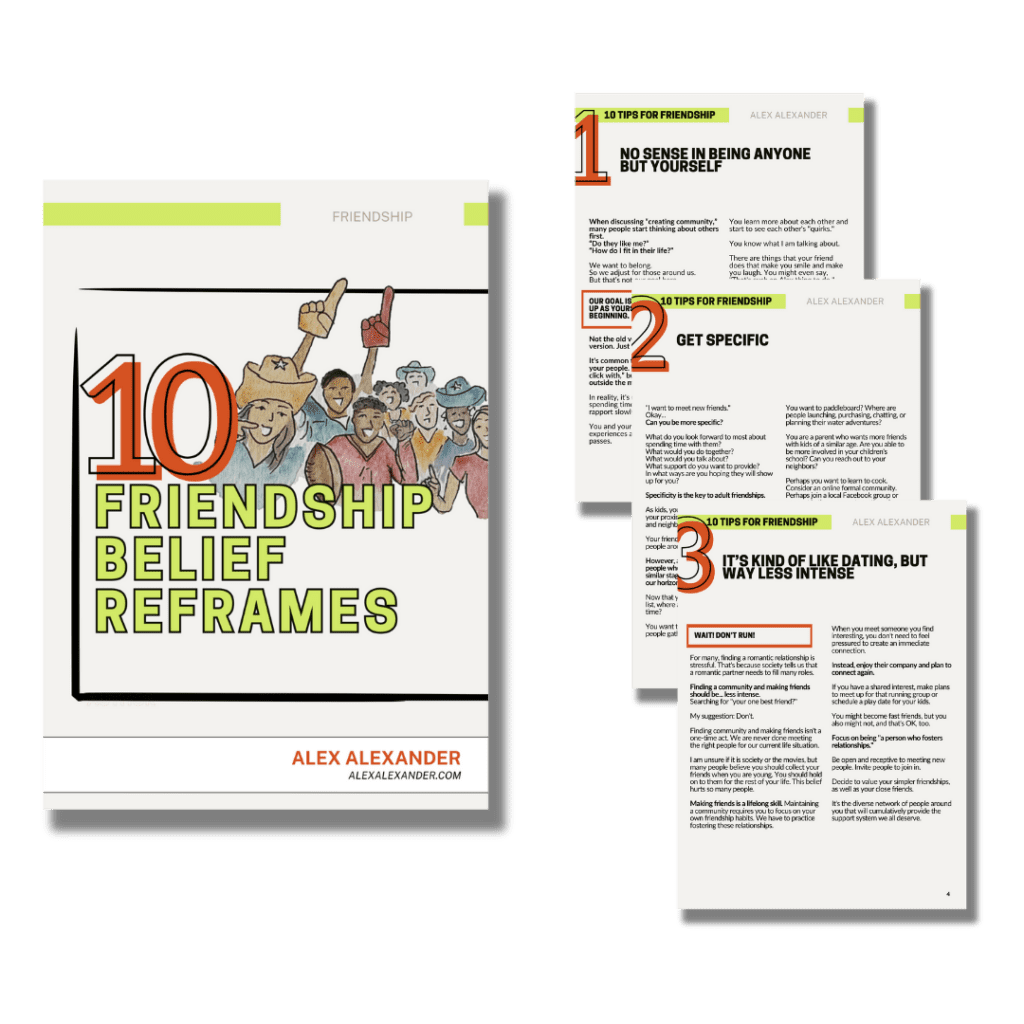
I AM GIVING AWAY MY SECRETS TO BETTER FRIENDSHIPS.
Reinvigorate your friendships and learn how to create stronger ones by incorporating my Top Friendship Reframes into your life. BONUS! An exclusive look at my upcoming book. Want to bring more purpose and value to the relationships that matter to you? Download the guide now.
Alex Alexander 29:12
And the reason this makes me feel so seen, it’s not even about me. But it is that I have shared my story in very small segments over a lot of years that contradicts everything of her experience. And her takeaway was to give a little more compassion, to hold that there might be multiple truths, to remember how painful this has been for me, even if she didn’t know what the backstory is. So if you are someone who has a great family situation, and you can’t imagine doing the things that someone is telling you like, not speaking your family or setting super strict boundaries, just like please remember my story. Please be a C. Please believe someone and stop forcing these narratives. Hold that two truths can exist even if you don’t understand it. And finally, if you have space, offer it to that person. I’ve talked about this before in my holiday episodes, you know, if you have a great family situation, let somebody in sometimes. Let them connect with your parents or show them that you care. You know, if somebody tells you that they depend on you, that they think of you as family, I recorded this episode about chosen family, really consider for a second, like, can you show up for them in the ways that that would require? And I think we all think that has to be some overarching, all encompassing way of showing up. But what it really might be is just asking them, like what would you call me for in that realm, in that we are family, I would do anything for you? Because it’s probably not everything. It might be that you’re the person who would drop everything and answer the phone in the middle of the night. Or you would, you know, use up the last of your budget for the month to buy an expensive plane ticket to be there or, you know, you take on the responsibility of being a medical contact or something. They might have really specific items. And might be as simple as being invited to the holidays, so they don’t have to be alone or connecting with other people in your life, parents or kids or feeling like a sibling in certain situations. If we’re going to take it a step further, and we’re talking about the systems… you know, I’m saying people like me, the system’s not working for me. But I truly don’t know if the system is working for most people. There are childless people out there who wish they had kids and for one reason or another don’t. And yet, they are surrounded in their community, in the place that they live by kids who maybe are like me and could have used a stable adult, even if it was somebody to come eat a popsicle in your backyard sometimes. Or there are parents and kids, parents who are completely overwhelmed and with love, a helping hand. Maybe you could be that. There are older generations wishing that they had children or grandchildren closer, but have children or you know, children aged people and grandchildren aged people in the neighborhood around them. Perhaps it’s somebody who’s lost a grandparent, and you really wish that you had that. And yet you’re surrounded by neighbors in their 80s, who are incredibly alone. There are so many people who are longing for connection and belonging, love support, but they lack the courage to take a risk. That’s what it is. That’s all I’ve done. I’ve decided that any risk wasn’t as bad as feeling alone as I was. It’s really not that special. And that’s exactly why I built this platform. You know, there are a lot of people stuck in structures that aren’t playing out the way that they want. Whether that’s as dire as my situation, or as simple as an elderly person, with extreme loneliness surrounded by people they could be connected to. It’s all just a risk. And you don’t have to be me. You don’t have to be at rock bottom or desperate. Or you might be in your own way. But we’re just trying to force all of this into a box. This, you know, family is everything box. When I really do think that on some scale, whether it’s as intense as mine, or as simple as being a new parent who wishes you had an extra set of hands one night a week, that being a little more open minded, that multiple truths are happening and taking some of those small risks could serve a lot of us. With that, I can’t believe I actually recorded this episode. And I’m just going to stand here and be really proud of myself because this matters. It matters. Because we really do just want to belong and feel supported. Lots of us out there in one way, shape or form. We want to build a support system that feels good. It doesn’t need to look good, doesn’t need to look how we’re told it needs to look. It just needs to feel good. And if you need permission to do that, I hope you give it to yourself. I hope you hear my words that it’s possible. And you know what? My greatest, greatest hope with everything I’m doing is that however many decades from now, people are holding these two truths and building what they need. I hope you all have a great rest of your week. I’m probably hiding under the covers right now with a massive vulnerability hangover. But I’ll talk to you all soon.
Alex Alexander [36:08]
Thank you for listening to this episode of Friendship IRL. I am so honored to have these conversations with you. But don’t let the chat die here. Send me a voice message. I created a special website just to chat with you. You can find it at alexalex.chat. You can also find me on Instagram. My handle, @itsalexalexander. Or go ahead and leave a review wherever you prefer to listen to podcasts. Now if you want to take this conversation a step further, send this episode to a friend. Tell them you found it interesting. And use what we just talked about as a conversation starter the next time you and your friend hang out. No need for a teary Goodbye. I’ll be back with a new episode next week.

